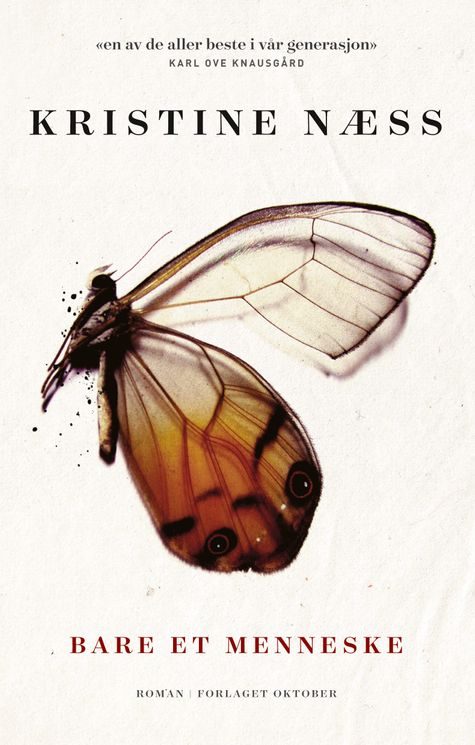Only Human
Nominated for The Nordic Council’s Literary Award 2015. Bea Britt lives alone in her grandmother’s house in a wealthy part of Oslo, where her father grew up. Early one morning, there are people out in the garden, looking for a twelveyear- old girl who has disappeared. Bea Britt used to see her going for a walk…
Nominated for The Nordic Council’s Literary Award 2015.
Bea Britt lives alone in her grandmother’s house in a wealthy part of Oslo, where her father grew up. Early one morning, there are people out in the garden, looking for a twelveyear- old girl who has disappeared. Bea Britt used to see her going for a walk with her little dog. The police find the girl’s rucksack in the garden, and because of this, Bea Britt becomes a suspect. At the same time, her grandmother’s story lives on inside her; everything which has been said and done in the house she lives in.
Only Human is an urgent and rich novel about enduring oneself and others, about what is needed when life wears thin, and about the illuminating power of love.
“Few are able to take language closer to life than Kristine Næss, she is one of the very best authors of our generation”
Karl Ove Knausgård
“Only Human combines a crime mystery from the media with original portraits of women in three generations … The novel questions our explanations and motives, even those we only provide for ourselves: Is it to see that one is only human, an insight into life’s vulnerability and the limits of our cognition? Or can the victimization one invoke the contrary be a pretext, a protection against action and cognition? … Only Human consists of three highly individual and yet interconnected stories, which together gives us a surprisingly multidimensional view at the lives we live and how we emerge as people for one another ”
Excerpt from the jury of The Nordic Council’s Literary Award
“Bravo, Næss! A dissecting, insightful and shockingly regognizable noel about inherited sin and the human condition … Only Human drills so deep, is so well-structured in its seemingly technical looseness, so dissecting … The poet Kristine Næss is a cornucopia of eloquent insights and strikingly precise images”
Dagbladet
“An engrossingly good novel on loneliness and love. A book that doesn’t let go. There are Ibsenesque qualities to Only Human. The past is a pattern that repeats itself, and confronting it is painful … The suspense and the momentum is kept up throughout the investigation of the disappearance … The best thing, however, is how the writing itself varies depending on whose story is being told … The dark mind of the character Bea Britt is complex and not easily forgotten once you get on the inside. But it’s worth the Journey.
Vårt Land
“Kristine Næss is more interested in the enigmas of the human mind, more than crime mysteries, and she drills deep into the familial and social frames that limit the lives of the three women she portrays … Only Human is Kristine Næss’ fourth novel … When she is now shortlisted for the Nordic Council Literature Prize (along with Jon Fosse), we can only hope that more readers will discover this writer. The nomination lifts her up into the light where she should be”
Dag og Tid
“The loneliness, emptiness and darkness of this novel doesn’t overshadow its elegance and the fine layers of self-irony and humour … Only Human is a dark, gripping, disturbing and entertaining novel which expands an already rich body of work”
Vagant
“An impressive latticework of generations, styles and diagnostic cultures … the author takes a huge risk – and succeeds: The chapters about Cecilie are written in the jargon of the times. “Cessi” thinks and speaks like a woman born more than a hundred years ago. Næss captures this generation’s vocabulary for mental ailments by adopting its style and tone. It makes the chapters about her strange and fascinating reading … Only Human analyses different generations and their language in a pleasurable and impressive form”
Aftenposten
“A woman on the brink of collapse, divorced and caught in a few obvious delusions. The novel relates a connection between her aggression and the life of her grandmother … The book’s postulate is that anger and unrest is passed through generations. The presentation is dark, scary and also has an ingredient of excitement as we follow the search for Emilie, the girl who is vanished without a trace”.
 Trønder-Avisa
Trønder-Avisa
“The attempt to seize the consciousness of the characters who internalize the world around them at an almost hyperactive manner, and who either do not want or are not able to integrate the community’s unwritten laws, can be recognized from Kristine Næss’ previous books … I am still dragged back into new entanglements in the three women’s lives … [The novel] leads me to reflect on my own life, and look at the world around me as if it is at the risk of being lost anytime”
Klassekampen

